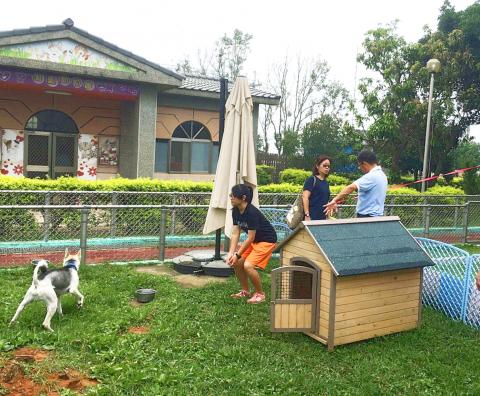Public animal shelters in eight municipalities last year received more animals than their capacities allowed, which an animal rights advocate said was due to official negligence in the run-up to the Nov. 24 local elections.
Public shelters in Taipei, Tainan, Taoyuan, Chiayi City and Hsinchu, Nantou, Yunlin and Pingtung counties have been housing more animals than they were designed for, Council of Agriculture data for November last year showed.
The Taipei shelter housed a total of 1,120 animals, almost double its maximum capacity of 610, the data showed.

Photo: Huang Chung-shan, Taipei Times
Shelters in Taichung and Kaohsiung, as well as Chiayi, Penghu and Kinmen counties, were at more than 90 percent capacity, the data showed.
Overcrowding at public animal shelters has been a problem since the implementation of a “no-kill” policy on Feb. 6, 2017, Council of Agriculture Department of Animal Industry Deputy Director Wang Chung-shu (王忠恕) said yesterday.
The no-kill policy stems from an amendment to Article 12, Paragraph 7 of the Animal Protection Act (動物保護法) passed in 2015, which previously stated that shelters could put down stray animals not adopted after 12 days in shelters.
After the amendment took effect in 2017, public shelters could only kill animals that have incurable diseases or infectious conditions, or pose great danger to public safety.
Instead of building more shelters, which is difficult in urban areas such as Taipei, the council has pushed local shelters to improve accommodation quality, promote adoption and neuter stray animals to reduce their numbers, Wang said.
Many local governments last year neglected their duties to supervise animal shelters, because they were preoccupied with the elections, Taiwan Animal Protection Monitor Network executive director Ho Tsung-hsun (何宗勳) said, but added that New Taipei City, Tainan and Taitung municipal authorities made a better effort.
Shelters should control the number of animals they house by only catching those that threaten people’s lives, he said.
In addition to reducing numbers of stray animals through the the “trap-neuter-return” program, the government should encourage animal adoption through diversified channels, including training dogs to guard schools, police stations and farms, Ho said.
Campaigners have called on the government to raise the penalty for people abandoning pets, who currently face a fine of NT$30,000 to NT$150,000.
However, Wang said that heavier fines would be disproportionate and improving animal protection education would be more effective than harsher punishments.

A drunk woman was sexually assaulted inside a crowded concourse of Taipei Railway Station on Thursday last week before a foreign tourist notified police, leading to calls for better education on bystander intervention and review of security infrastructure. The man, surnamed Chiu (邱), was taken into custody on charges of sexual assault, taking advantage of the woman’s condition and public indecency. Police discovered that Chiu was a fugitive with prior convictions for vehicle theft. He has been taken into custody and is to complete his unserved six-month sentence, police said. On Thursday last week, Chiu was seen wearing a white

The Taoyuan Flight Attendants’ Union yesterday vowed to protest at the EVA Air Marathon on Sunday next week should EVA Airway Corp’s management continue to ignore the union’s petition to change rules on employees’ leave of absence system, after a flight attendant reportedly died after working on a long-haul flight while ill. The case has generated public discussion over whether taking personal or sick leave should affect a worker’s performance review. Several union members yesterday protested at the Legislative Yuan, holding white flowers and placards, while shouting: “Life is priceless; requesting leave is not a crime.” “The union is scheduled to meet with

‘UNITED FRONT’ RHETORIC: China’s TAO also plans to hold weekly, instead of biweekly, news conferences because it wants to control the cross-strait discourse, an expert said China’s plan to expand its single-entry visa-on-arrival service to Taiwanese would be of limited interest to Taiwanese and is a feeble attempt by Chinese administrators to demonstrate that they are doing something, the Mainland Affairs Council said yesterday. China’s Taiwan Affairs Office (TAO) spokesman Chen Binhua (陳斌華) said the program aims to facilitate travel to China for Taiwanese compatriots, regardless of whether they are arriving via direct flights or are entering mainland China through Hong Kong, Macau or other countries, and they would be able to apply for a single-entry visa-on-arrival at all eligible entry points in China. The policy aims

COUNTERMEASURE: Taiwan was to implement controls for 47 tech products bound for South Africa after the latter downgraded and renamed Taipei’s ‘de facto’ offices The Ministry of Foreign Affairs is still reviewing a new agreement proposed by the South African government last month to regulate the status of reciprocal representative offices, Minister of Foreign Affairs Lin Chia-lung (林佳龍) said yesterday. Asked about the latest developments in a year-long controversy over Taiwan’s de facto representative office in South Africa, Lin during a legislative session said that the ministry was consulting with legal experts on the proposed new agreement. While the new proposal offers Taiwan greater flexibility, the ministry does not find it acceptable, Lin said without elaborating. The ministry is still open to resuming retaliatory measures against South